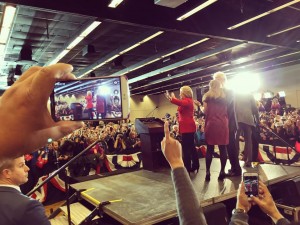A Woman Won the Iowa Caucuses for the First Time. No Asterisk Needed.
 In April 2015, the Barbara Lee Family Foundation (BLFF) and the Center for American Women and Politics (CAWP) launched Presidential Gender Watch 2016, a project to track, analyze, and illuminate gender dynamics in the 2016 presidential election. With the help of expert scholars and practitioners, Presidential Gender Watch worked for 21 months to further public understanding of how gender influences candidate strategy, voter engagement and expectations, media coverage, and electoral outcomes in campaigns for the nation’s highest executive office. The blog below was written for Presidential Gender Watch 2016, as part of our collective effort to raise questions, suggest answers, and complicate popular discussions about gender’s role in the presidential race.
In April 2015, the Barbara Lee Family Foundation (BLFF) and the Center for American Women and Politics (CAWP) launched Presidential Gender Watch 2016, a project to track, analyze, and illuminate gender dynamics in the 2016 presidential election. With the help of expert scholars and practitioners, Presidential Gender Watch worked for 21 months to further public understanding of how gender influences candidate strategy, voter engagement and expectations, media coverage, and electoral outcomes in campaigns for the nation’s highest executive office. The blog below was written for Presidential Gender Watch 2016, as part of our collective effort to raise questions, suggest answers, and complicate popular discussions about gender’s role in the presidential race.
The Iowa caucuses have led the presidential nominating process for over four decades. In that time, just four women candidates have competed for Iowans’ votes. Including Clinton twice (for her 2008 and 2016 bids), women are just 4.8% of all 105 candidates to have ever competed in Iowa’s caucuses. They represent three of 48 (6.25%) Democratic and two of 57 (3.5%) Republican bids for Iowa’s delegates.
Democratic candidate Shirley Chisholm earned just 1% of state delegates in 1972 and no woman competed in either major party caucuses again until Hillary Clinton won 29.5% of state delegates in 2008. Republican Elizabeth Dole dropped out of the 2000 race in October 1999, three months before Iowans caucused. Democrat Carol Moseley Braun dropped out of the 2004 race just days ahead of Iowa’s caucuses, using the press conference in which she announced her withdrawal to urge Iowans to caucus for Howard Dean. In 2012, Republican Michelle Bachmann earned 5% of caucus votes, five months after she beat all other GOP candidates in the Iowa Straw Poll.
For the first time, women competed in both major party caucuses in 2016. Carly Fiorina won 1.9% of Republican caucus votes, coming in seventh place in a GOP field of 12. Hillary Clinton earned 49.9% of state delegate equivalents, 0.3% more than Bernie Sanders. Her margin of victory is the closest of any Iowa Democratic caucus contest to date. Still, she won, and – in doing so – became the first woman from either party to win the Iowa caucuses. Even more, she nearly doubled the support of any other woman candidate to date, increasing her share of state convention delegates by 20 percentage points since her 2008 bid.

The historic nature of Clinton’s bid needs no asterisk. Despite reports that the race was a “virtual tie,” speculation that she won due to the flip of some coins (which has been proven false), or even questions raised by the Sanders campaign about the final results, the Iowa Democratic Party’s final count of state delegate equivalents was 700.59 (Clinton) to 696.82 (Sanders). In caucusing, there are no recounts. That means that Clinton will hold the honor of being the first woman to win the Iowa caucuses. Period. End of sentence.
Clinton is also the only woman candidate who has ever won any presidential primaries to date, earning the plurality of votes in 23 state nominating contests in 2008.
The rarity of women’s presence, let alone success, in presidential contests makes the relative oversight of or attempts to undermine Clinton’s success on Monday night all the more frustrating. In a race where Clinton – and, in some cases, her supporters – are criticized for voting her because she’s a woman, the narrative of breaking the highest, hardest glass ceiling appears to be somewhat tainted, taken as a political ploy for votes instead of demonstrative of political progress toward gender parity. Maybe that’s why so few headlines have noted the historic nature of Clinton’s win.
But maybe the asterisk placed on Clinton’s victory runs deeper, consistent with suggestions that her success is not hers alone to claim; in 2008, Chris Matthews (among others) argued, “the reason [Clinton’s] a candidate for President, the reason she may be a front runner, is that her husband messed around.” Even in 2016, some commentators have argued that Joe Biden “buoyed” Clinton’s bid by opting not to run, Bernie Sanders gave Clinton “an assist” by defending her against email-related attacks, or Republicans “saved” her by overreaching in their attacks. Successful women are sensitive to these seemingly benign claims because they too often undermine their independent achievements. They asterisk women’s accomplishments and power as, at least partly, dependent on the power ceded by men.
Whatever the reasons for the relative inattention to or cautious framing of Clinton’s win on Monday, history will recognize it as one marker in women’s political progress at the presidential level. Remember, women’s political successes have always been hard-won. In 1920, women won the right to vote by one vote cast by a 24 year-old, male Tennessee legislator. From that point on, women had a formal voice in the presidential election process. Women- and men – used that voice on Monday night’s Democratic caucuses to give a woman candidate the win for the first time in Iowa’s history. No asterisk needed.


